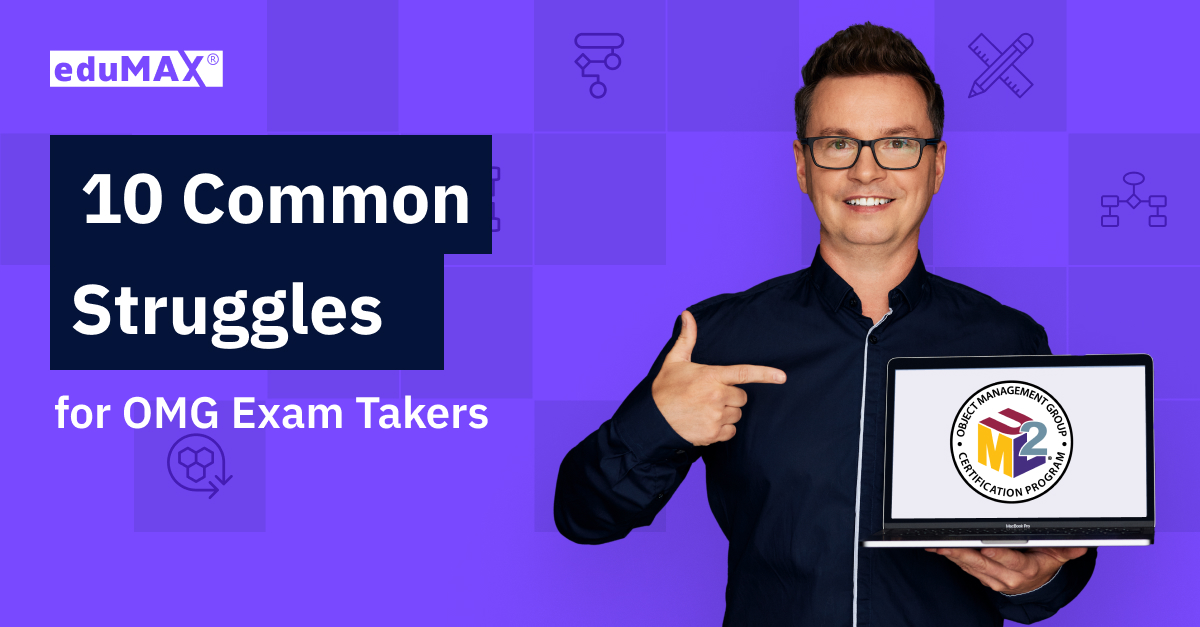10 Common Struggles for OMG Exam Takers

12-10-2023
6 min
Studying for and taking an OMG exam can be tough because there's a lot of information to learn and understand. The concepts are complex, and finding the right amount of time to study can be tricky.
Here are 10 common pain points for exam takers:
1. Information Overload
- Processing the vast amount of information required for the exam can be overwhelming. It can be challenging to prioritize what to learn first.
2. Complex Concepts
- Some concepts in the OMG exams (BPM 2 or UML 2) are complex. It takes time and patience to develop a deeper understanding of what may at first seem like simple concepts., The result can be confusion and frustration for test-takers.
3. Lack of Practice Material
- It can be difficult to find high-quality practice questions and simulations that accurately represent the exam format and difficulty level.
4. Time Management
- It’s not easy to balance study time with other responsibilities like work, family, and personal commitments.
5. Stress and Anxiety
- Preparing for an important exam can lead to stress and anxiety, potentially affecting focus and performance.
6. Fear of Failure
- The fear of not passing the exam, especially if there's a significant investment involved, can be a major source of anxiety.
7. Unclear Exam Format
- Not knowing the exact format of the OMG exams can lead to uncertainty in preparation. Students may ask, Will the exam be multiple choice? Will I have to read long case studies? How long are the questions?
8. Limited Study Resources
- There are few comprehensive and up-to-date study materials, textbooks, and resources for OMG exams.
9. Retaining Knowledge
- Ensuring that the knowledge gained during preparation is retained until the exam date can be a struggle. It’s one thing to pass today’s practice quiz. It’s another thing to remember and apply the same material after weeks or months have passed.
10. Difficulty Applying Concepts
- Understanding theoretical concepts is one thing, but applying them to real-world scenarios can pose a challenge for exam takers.
Self-directed study is a great place to start, but it can take months of stumbling, and sometimes repeated exam sittings, to tackle the BPM 2 (OCEB 2) or UML 2 (OCUP 2) exams on your own.
Look for a training course that provides:
- Qualified instructors. It’s not enough to find an instructor who has passed the exam you’re targeting. You’ll be better off with an instructor with experience in applying the underlying concepts in a variety of business contexts. Even better? Study with an instructor who helped develop the BPM 2 (OCEB 2) or UML 2 (OCUP 2) exam question bank.
- High-quality materials. It’s not enough to have one or two examples of each common design pattern. You want study materials that will put these concepts in context.
- Value for money. Whether you’re investing your own funds or your employer’s training budget, you’ll want to get what you pay for. The cheapest option may not offer the best value. Before you choose a provider, ask these questions:
- Does the instructor have experience across more than one industry? It helps if your instructor has applied workflow concepts in a variety of contexts.
- Does the instructor have a background in education and industry? Bonus points if your instructor knows how to teach as well as how to pass the exam you’re preparing for.
- Does the instructor have experience leading projects, or only as an individual contributor? Leadership experience gives an instructor a broader perspective on how a transformation project succeeds from beginning to end. Choose someone who has done the work.
- Has the instructor been involved in developing the curriculum for the training program you’re signing up for? If you have any teaching experience of your own, you’ll know the difference between teaching your own material and teaching someone else’s. It’s like the difference between serving spaghetti from a can, or from your own kitchen.
The eduMAX training materials are created by the company's founder, Filip Stachecki. Filip takes an active part in defining the scope of the OMG exams, and creates many of the exam questions.
In his more than 20 years of teaching experience, he has prepared hundreds of people to pass OMG exams.
